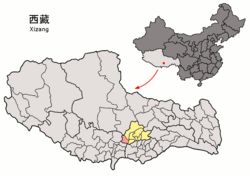Nyêmo County
|
Nyêmo County 尼木县 • སྙེ་མོ་རྫོང་། |
|
|---|---|
| County | |
 Location of Nyêmo County within Tibet |
|
| Coordinates: 29°26′19″N 90°09′20″E / 29.438659°N 90.155420°ECoordinates: 29°26′19″N 90°09′20″E / 29.438659°N 90.155420°E | |
| Country | People's Republic of China |
| Region | Tibet |
| Prefecture-level city | Lhasa |
| County seat | Nyêmo Town |
| Area | |
| • Total | 3,275 km2 (1,264 sq mi) |
| Population (2003) | |
| • Total | 30,000 |
| Time zone | China Standard (UTC+8) |
| Nyêmo County | |||||||
| Chinese name | |||||||
|---|---|---|---|---|---|---|---|
| Simplified Chinese | 尼木县 | ||||||
| Traditional Chinese | 尼木縣 | ||||||
|
|||||||
| Tibetan name | |||||||
| Tibetan | སྙེ་མོ་རྫོང་། | ||||||
|
|||||||
| Transcriptions | |
|---|---|
| Standard Mandarin | |
| Hanyu Pinyin | Nímù Xiàn |
| Transcriptions | |
|---|---|
| Wylie | snye mo rdzong |
| Tibetan Pinyin | Nyêmo Zong |
Nyêmo is a county in the Lhasa prefecture-level city west of the main center of Lhasa, Tibet. It lies on the north bank of the Yarlung Tsangpo River, the northern part of the Brahmaputra. The county has an area of 3,276 square kilometres (1,265 sq mi), and as of 2011 had a population of 30,844 people, mostly engaged in agriculture or herding.
"Nyemo" is the Tibetan word for "wheat". It is located in the middle section of the Brahmaputra, 140 kilometres (87 mi) from Lhasa. It is mainly agricultural and pastoral, with an area of 3,276 square kilometres (1,265 sq mi) and an average elevation of 4,000 metres (13,000 ft). The county seat is 3,809 metres (12,497 ft) above sea level. The Nimu Maqu River flows through the county from north to south. The Yarlung Tsangpo River forms its southern boundary. The highest point is a peak at 7,048.8 metres (23,126 ft) above sea level, and the lowest point is where the Maqu River empties into the Brahmaputra at an elevation of 3,701 metres (12,142 ft).
The county has a temperate semi-arid plateau monsoon climate, with about 100 frost-free days. Annual rainfall is 324.2 millimetres (12.76 in). Nyêmo County mineral resources are copper, molybdenum and peat. Wildlife includes leopards, bears, lynx, river deer, black-necked cranes, and pheasant. Wild plants include Fritillaria, Cordyceps, berberine and lotus.
Nyêmo was the birthplace of the great translator Vairocana, and the place where the teacher Padmasambhava subjugated local spirits during his journey from Nepal to Lhasa. Old pre-Buddhist cults have survived into the modern era along with monasteries of the different Buddhist traditions. The ala priestly tradition is a local hybrid of traditional religions and Bhuddism that is distinctive of Nyemo. Female mediums, possessed by spirits, performed healing ceremonies until the time of the Cultural Revolution.
In late 1968 a revolt in the rural areas of Tibet began in Nyêmo, caused by shortages of food and the chaos of the Cultural Revolution. The revolt later spread to twenty more counties in the Tibet Autonomous Region. In the 1969 "Nyemo incident" the followers of Nyêmo nun Trinley Chödrön combined with the forces of the Maoist Gyenlo party organization. Their “Army of the Gods” attacked government and army compounds and rival cadres throughout the region over the course of several weeks in June 1969. Tinley Chodron, who was said to be an emanation of the holy bird Labja Gongmo from the Epic of King Gesar, was executed in Lhasa later that year.
...
Wikipedia
